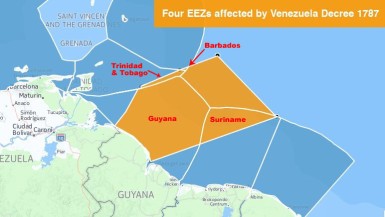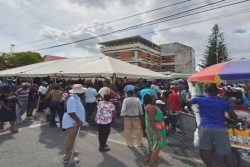Foreign Affairs Minister Carl Greenidge says Guyana is pleased with Caricom’s response to the most recent escalation of its border controversy with Venezuela.
“Caricom has, after looking at the issue, lent support to Guyana to ensure that Venezuela respects international treaties and boundaries,” Greenidge told Stabroek News.
“I think Caricom has shown they can operate on the basis of principle,” he also said.

Barbados 294 sq km;
Trinidad & Tobago 4,531 sq km;
Guyana 118,156 sq km and
Suriname 34,419 sq km.
Though small, the areas affected for the two island nations are comparable with the sizes of their actual countries, for example, the island of Tobago is 300 sq km.
During their July 2 to July 4 summit in Barbados, a delegation of Caricom Heads of Government met with Venezuela’s Vice President Jorge Alberto Arreaza and Foreign Minister Delcy Rodriguez to state the Community’s “grave concern” over its controversial maritime decree, which applies to the territory and waters of Guyana and other member countries.
Following the summit, Caricom leaders called on Venezuela, in the spirit of friendship and cooperation, to withdraw the elements of the decree that apply to the territory and maritime space of member states.
Greenidge noted that Prime Minister of Antigua and Barbuda Gaston Browne, in his capacity as Caricom Chairman along with several other heads of state, hammered out an agreement with Arreaza and Rodriguez.
Greenidge said he was not part of the meeting, where it was reported that an agreement was being sought that would be satisfactory to Guyana along with the other Caricom states that are affected by the decree.
The May 26 maritime decree came on the heels of an announcement by US oil giant ExxonMobil that it had discovered what is believed to be a large oil deposit off the coast of Demerara.
President David Granger told fellow leaders last Thursday that, apart from Guyana, the decree has implications for Barbados, Grenada, Suriname and Trinidad and Tobago. Both Suriname as well as Venezuela’s western neighbour Colombia have lodged formals objection to the maritime decree.
Guyana has called for the withdrawal of the decree and Greenidge said what came out of the meeting with Arreaza and Rodriguez was that “Caricom regards the attempt to annex territories of these countries by Venezuela as illegal.”
He said that for Venezuela to arbitrarily try and generate its own maritime laws while not be a signatory to the UN’s Convention of the Laws of the Sea was without merit.
According to Greenidge, it is important to realise that Venezuela’s controversial stance is new and that Guyana’s territorial sea, Exclusive Economic Zone as well as the extension of the continental shelf would all be compromised and annexed under the decree.
Although the Caricom leaders called for the withdrawal of aspects of the decree, the absence of forthright condemnation in their statement at the conclusion of the summit is seen as an attempt to not offend Venezuela, which is an influential player in the region by virtue of its PetroCaribe fund and other aid facilities.
Greenidge, however, warns that the controversy has taken on a different dynamic as the decree is enforceable by the Venezuelan navy. “It is written into the decree [that] it is enforceable by the navy; they can seize vessels and arrest people that makes this all the more complicated,” Greenidge told the Stabroek News.
He noted that Venezuela has flexed its muscles in the past and referred to the seizure of the RV Teknik Perdana, which was being used by Texas-based Anadarko for a seabed survey in October, 2013. Guyana awarded Anadarko Petroleum a deep-water exploration license in June, 2012.
He noted that Venezuela’s claim to maritime territories of a number of Caribbean countries meant that this issue was not just “a Guyana/Venezuela problem. It is a Venezuela/Caribbean problem because it affects Caricom.”
He noted that French Guiana as well as Colombia were also being targeted under the Venezuela’s decree.
Greenidge said Venezuela did not have any coastlines that would allow for it to “draw lines in the Atlantic Zone,” and that was done arbitrarily with no regard for international law.
He noted that what Guyana expects from Caricom is a voice of solidarity. “We expect them to say this is unacceptable and the decree should be withdrawn,” he added.
He said that while at the Head of States conference Guyana told other member states that “silence on this attempt to annex maritime territories is tantamount to agreement.”
In his address at the summit, Granger linked Guyana’s fate to the rest of Caricom, while warning that Venezuela’s hegemonic actions threatened an arc in the region stretching to its easternmost member, Suriname.
“Guyana seeks the support of its sister states in the Caribbean Community. We clamour for the succour of the Commonwealth. We yearn for the security of the United Nations and the shelter of international law to bring a peaceful end to Venezuela’s rejection of the validity of a boundary which has been defined as a ‘full, perfect and final’ settlement and which all parties, at that time, vowed to accept and respect for all time,” he said.
He said the territorial waters are the region’s common patrimony, to which it has a responsibility to possess, protect, and to bequeath to posterity.
“We must remove any potential sources of conflict among our member states by ensuring the process of maritime delimitation in accordance with the international Law of the Sea,” he said.
“We must be prepared also to exercise absolute sovereignty over our maritime waters and resources. We must protect these resources from being invaded and annexed. We must pursue the principle of collective security which provides that a threat to any of our members represents a threat to our entire community,” Granger further added.




